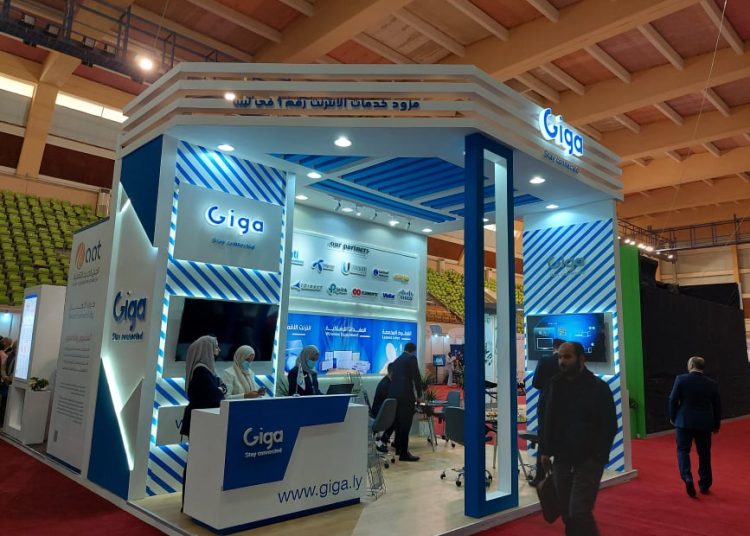Speaking exclusively to Libya Herald on the opening day (Sunday) of the Second Libyan International Forum for Information Technology (LIT2) at Tripoli Sports City running from 27-30 March, Aimen Sabkha, Co-founder of the private sector Internet Service Provider (ISP), Giga, said ‘‘Internet penetration in Libya has grown significantly since 2012 from less than 10% then to more than 60% in 2022.‘’
Giga is one of the largest private ISP’s covering most cities in Libya.
‘‘Thanks to the inception of private ISPs such as Giga and the launch of 4G networks by public companies such as Libyana, Almadar and LTT, internet demand and delivered traffic levels have reached an estimated total of 500 Gbps.
Despite spectrum resources being strongly monopolised by the public sector, the private sector manages half of the delivered bandwidth to home users.’’, Sabkha explained.
Asked about the obstacles his company faces, Sabkha said ‘‘The biggest challenges Giga faces are the lack of a dedicated frequency allocation in the wireless spectrum and the lack of a suitable fibre connectivity pricing.’’
The state is still a monopoly
Off record, however, many sector experts and exhibitors at the show complained to Libya Herald of the fact that one of the main problems facing the sector is the fact that the Libyan state still monopolises the ITC sector. This is a legacy of the Qaddafi era when Qaddafi’s eldest son Mohamed run the state ITC sector.
Successive heads of the LPTIC, the state ITC holding company, had vowed to liberate the sector and allow the private sector to compete more. Indeed, in the intervening years private ISPs have eaten into the share of the main state ISP, Libya Telecoms and Technology (LTT). However, critics say the state monopoly is only making superficial concessions to the private sector and it still controls everything in the ITC sector.
One exhibitor told Libya Herald, again off record, that total privatisation would put an end to the state ITC. ‘‘Liberalisation would lose thousands of ITC state employees their jobs. It is not in their interest to liberate the sector’’.
The state is not organising the use of frequencies
Sabkha’s comments about the ‘‘spectrum’’ allude to the fact that the Libyan state licencing authority has failed to organise the allocation and restrictive use of the various broadcast frequencies/spectrums that ISPs use. This has resulted in ‘‘chaos’’, one exhibitor at the event confided off record to Libya Herald.
Frustration for ISP and fee-paying customers
The net result of this is frustration for ISPs and the fee-paying consumer (including Libya Herald). A year’s WI-FI connection, for example, can cost over LD 700 per annum – depending on packages. While this may not be much when converted to a hard currency, by Libyan standard it’s a lot of money – for very poor service.
Fixed Wi-Fi is very inconsistent across Libya. Strength of frequency coverage varies not only from one area to another but also from one ISP to another.
Feedback from IT engineers suggests that it depends on the location of ISP’s broadcasting antenna’s position. Some customers have been advised to increase the height of their receiving antenna or change its direction to another broadcasting antenna.
Many Wi-Fi customers, including Libya Herald, have swapped, and changed to different ISPs in an effort to get a consistent strong signal. Often, users are forced to use Bluetooth or hotspot their mobile internet for their laptop. This is not always ideal.
Libya should get its ITC home in order before exporting
The paucity of the country’s internet service and mobile phone coverage stands in contrast with the Libya Export Promotion Centre’s (LEPC) announcement at the show that it aims to export Libya’s ITC services. One exhibitor commented to Libya Herald ‘‘lets try and get our internal house in order before trying to export ITC services abroad!’’
Tripoli IT exhibition opens for four days – LibyaHerald
Taqnya Expo: Tripoli, 9-12 November – LibyaHerald
Prime Minister Aldabaiba replaces Faisel Gergab as chairman of LPTIC – LibyaHerald
Silphium marine cable repairs commence at Derna landing point | (libyaherald.com)
Repairs made on fibre-optic cable in Jebel Akhdar | (libyaherald.com)
Work on undersea cable to Crete starts | (libyaherald.com)









